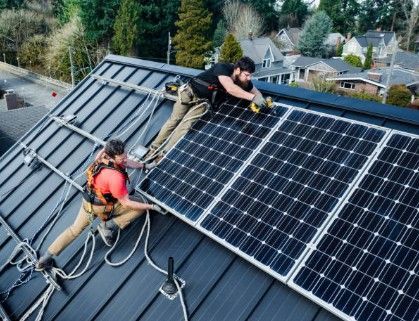Dealing with HOA Restrictions? Solar Installation for Home Experts Can Manage
Thinking about solar installation for home but worried your HOA might block the plan? Many homeowners deal with the same thing, but most rules aren't as strict as they seem. Plus, there are regulations to protect your right to go green, and experts know how to handle these situations.
Key Takeaways:
- HOAs may limit where and how you install a solar panel system. Some may require approval, so this might slow down the process.
- There are no federal laws protecting installations from HOA regulations in Canada. Local provinces support sustainable electricity, but the rules still apply.
- Experts guide the rules, designing solar systems that comply with aesthetic and placement constraints and speeding up the approval process.
What are HOA Restrictions?
A recent Reddit thread on the "legaladvice" subreddit highlighted a conflict escalating between homeowners and homeowners' associations regarding installing panels. One homeowner expressed frustration over their HOA's outright ban despite the clear economic and environmental benefits.
The homeowner recounted their experience: "My husband and I are eager to install panels on our new home. However, the property management company unequivocally stated that they are strictly prohibited. We obviously want to avoid legal action, but it's incredibly frustrating that our HOA is essentially forcing us to pay higher electricity bills for our own home."
Homeowners Associations (HOAs) set rules to maintain the look and feel of a neighbourhood. While these can help preserve property values, they sometimes limit your ability to install renewable energy systems.
Common limitations in Canada include:
- Aesthetic Guidelines. Require your property to "match" the neighbourhood, which could limit the fitting of your renewable systems.
- Placement Limits. Some might restrict their installation on the visible parts of the roof, which can affect efficiency.
- Approval Processes. Need to approve big changes like adding sunlight-based collectors, which can slow things down.
Legal Framework in Canada
Canada has no federal law protecting home solar panels installation from the constraints. Instead, it's up to individual provinces or municipalities to decide.
For example:
- In Alberta, the Law of Property Act does not recognize a legal right to sunlight to generate power. This means that your neighbours may be able to restrict the installation of your panels if they believe it will impact their access to sunlight.
- Some provinces, like Ontario, have renewable energy programs but don't override the rules entirely.
The lack of a unified law means working with your HOA is the best solution.
Common Challenges
A few common scenarios homeowners face with HOAs in Canada:
- Visibility Controls. Modules on roofs that face the street might be restricted, even if it's the best spot for sunlight.
- Appearance Concerns. Some argue that they clash with the "look" of the neighbourhood.
- Lengthy Process Times. The approval process can take weeks or months, delaying your project.
Why You Should Work with Installation Experts
If you're dealing with limitations, team up with experts to make the process smoother. They know the details of steering complicated controls and can help you get your approval while optimizing your system for maximum power production.
Simplifying Regulations and Restrictions
Experts have experience reading these documents and can quickly pinpoint areas where flexibility exists. For example, they might require renewable systems not to be visible from the street. By strategically placing them on less visible roof parts, an expert can design a system that complies with this rule without sacrificing efficiency.
Customizing Approved Designs
Experts know how to balance requirements with your goals. They can design systems that:
- Fits aesthetic practices, like using low-profile or all-black modules to blend in with your roof.
- Maximize sunlight capture, even with placement constraints.
Understanding Legal Protections in Canada
While Canada doesn't have nationwide laws protecting homeowners' rights, there are permitted precedents and municipal bylaws that could work in your favour. Companies are familiar with these frameworks and can advocate on your behalf.
For example:
- British Columbia's bylaws encourage renewable energy use, and municipalities like Vancouver support installations as part of sustainability plans.
- Some may hesitate to ban these systems outright in Alberta due to the province's broader renewable energy source initiatives.
Saving You Time and Stress
The process can be long and frustrating. Companies handle this process by preparing the necessary documents and communicating directly with the Homeowners' Association to address concerns. This saves you the hassle and warrants that nothing gets missed.
A Step-by-Step Guide to Managing HOA Regulations
Adding green power to your home is a great way to save money and reduce your carbon footprint. But if you live in a neighbourhood with restrictions, it can feel like a big hurdle.
| Step | Action | Details |
|---|---|---|
| 1. Check the Rules | Read the guidelines (CC&Rs). | Look for rules on the panels’ placement, design, or visibility. |
| 2. Know Your Rights | Research solar power policies in your area. | Alberta, BC, and Ontario offer incentives but don’t override the rules. |
| 3. Work with Experts | Hire an experienced installer. | Use low-profile renewable power systems and strategic placement to meet the requirements. |
| 4. Submit a Proposal | Prepare a detailed plan with your installer. | Include specs, aesthetic solutions, and benefits like cost savings and property value increase. |
| 5. Address the Concerns | Attend meetings and present your case. | Highlight benefits like higher property values and reduced carbon footprint. |
| 6. Get Legal Help | Seek legal advice if your request is unfairly denied. | Consult a lawyer or local renewable power advocates as a last resort. |
How Professional Installers Simplify the Process
These professionals bring experience, creativity, and knowledge of local regulations, guaranteeing you can install modules without unnecessary stress.
Suppose you're a homeowner wanting renewable electricity but must keep the roof uniform. The installation team suggests sleek, all-black panels that blend in with your roof. They also work with the HOA to highlight benefits like higher property value and lower electricity bills.
They explain how solar panels save money by reducing how much energy you use from the grid and supporting clean energy. Installing solar panels is a smart, eco-friendly choice for your home and community.

Experts Have Answers
You don't have to choose between being eco-friendly and keeping your HOA happy. Experts know how to design systems that work and get approvals without stress. A trusted installer can help you set up a home solar energy system. With this power system, you can generate excess sun energy to use or store. The National Renewable Energy Laboratory says this can save money and help the environment.
We at Coquitlam Solar Energy will guide you through your HOA's regulations to create a smooth and seamless
solar installation process. We'll develop a customized design plan that adheres to their specific guidelines.
Frequently Asked Questions
Are there restrictions on ground-mounted panels?
- Some restrict where you can place them to avoid them being visible from the street.
- There may be regulations on how big or tall the designs must be.
- Need to blend with the surroundings to keep the neighbourhood uniform.
- You'll likely need approval before installing, including submitting a plan.
What is the common installation cost in a neighbourhood with constraints?
The costs in Canadian neighbourhoods with strict regulations range from $10,000 to $25,000. The cost depends on:
- System Size. Larger systems cost more.
- Rules. Placement to meet the guidelines could increase the cost.
- Installation Difficulty. More complex installations due to the rules can increase costs.
- Location. Costs can vary by province.
- Incentives. Local programs or rebates can help lower the cost.
For a more accurate estimate, consult with a local expert.
How long does it normally take to get the approval?
It takes 2 to 3 months to get the approval, but this can vary:
- Process. Some HOAs approve quickly, while others take longer.
- Documentation. The more complete your plan, the faster the review.
- Meetings. Approval might depend on meeting schedules, which can be monthly or quarterly.
- Complexity. Simple requests get approved faster; complex ones might take longer.
Expect at least 30 to 60 days for approval.
CONTACT
Telephone: 604-337-1958
E-mail: info@coquitlamsolarenergy.ca
LOCATION
Coquitlam, BC V3B 0A4, Canada
Coquitlam Solar Energy | All Rights Reserved | 2023
